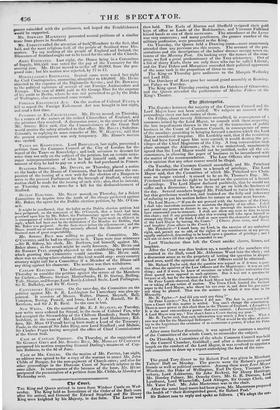tar ifictropoii.O.
The disputes between the majority of the Common Council and the Lord Mayor have not been settled. We subjoin an account of the proceedings since our last notice of them.
On Friday, about twenty Aldermen assembled, in consequence of a summons issued by the Lord Mayor, to consult with them respecting- the.late impediments thrown in the way of the transaction of public business in the Court of Common Council, in consequence of some of the members persisting in bringing forward a motion which the Lord Mayor considered irregular. His Lordship said, that if the resolution that had been forced upon him were carried, it would destroy the pri- vileges of the Chief Magistrate of the City. A long conversation took place amongst the Aldermen ; who, it was understood, unanimously agreed that the Lord Mayor would not be justified, under all the cir- cumstances, in allowing the paper of business to be incumbered with the matter of the recommendation. The Law Officers also expressed their opinion that any other course would be illegal.
On Tuesday, the Common Council assembled, and Mr. Pritchard called the attention of the Court to a breach of privilege. The Lord Mayor said, that the Committee of which Mr. Pritchard was Chair- man no longer existed : it ceased to be on St. Thomas's Day. Mr. Pritchard insisted on his right to be heard on the question of a breach of privilege. The Lord Mayor declared positively, that he would not suffer such a discussion : he was there to go on with the business of the day. Several members begged Mr. Pritchard to waive his motion ; but that gentleman would not, and insisted on the folly and indecency of refusing to put his motion before its nature or terms were known. The Lord Mayor—" If you do not proceed with the business of the Court, I shall take immediate measures to maintain the dignity of my office. I shall not permit any person to dictate to me, or to interrupt the business which I have summoned you to transact. I shall not allow any man to dare to insult this chair; and if any gentleman after this warning will take upon himself to attempt any thing of the kind, I shall at once assert the character and dignity of the Lord Mayor by leaving the Court." (Cheers from some, and his,es and laughter from others in the Court.) Mr. Pritchard—" I stand here, my Lord, in the exercise of my undoubted right, and, permit me to add, of the rights of my constituents in my person, equally undoubted, demanding to be heard upon a question of privilege ; and I will not sit down till that right is conceded to me."
Lord Winchester then left the Court amidst cheers, hisses, and laughter.
After the Court was thus broken up, a number of the members who remained in the Hall, voted Mr. Alderman Wood into the chair ; and a discussion arose as to the propriety of letting the question in dispute stand over, until the opinion of the Law Officers could be obtained.
Mr. Richard Taylor said, that the question was argued as if it were a ques- tion about the opinions of the Law Officers and the Magistrates: it was no such thing; and if it were, he knew of occasions on which higher authorities than those quoted were opposed to such opinions. But it was not a question fur lawyers at all, but for the decision of the Court. Sir Peter Laurie observed, that the Lord Mayor had the discretion of putting on or taking off any notice of motion. The Town Clerk handed the business paper to the Lord Mayor, who threw his eye over it, and drew his pen across any thing he pleased. That was the manner in which it was done in his Mayoralty.
Mr. R. Taylor—" And did you omit any thing ?"
Sir Peter Laurie—" No, I believe I did not. The fact is, you never will have a Court till this matter is settled. You can't change the constitutimi. There is more power in this chair than in the Throne of England. (Laughter.) It is the most extraordinary power that ever existed. (Increased laughter.) A Lord Mayor may say, ' You shan't have a Court during my year.'" Mr. R. Taylor said, that such information was worth a Jew's eye. What a case was this for the Municipal Reformers ! What would be the effect of show- ing to the Legislature the existence of so monstrous a power, if what Sir Peter said was true !
After some further discussion, it was agreed to summon a meeting of the Committee of the whole Court, to reconsider the subject.
On Thursday, a Committee of the whole Common Council was held in the Council Chamber, Guildhall ; and after a discussion of some length on the conduct of the Lord Mayor, it was resolved to appoint a sub.committee to draw up a report embodying the facts of the case.


























 Previous page
Previous page